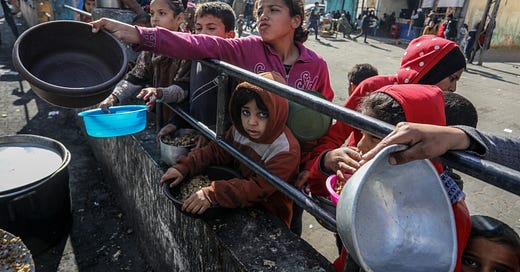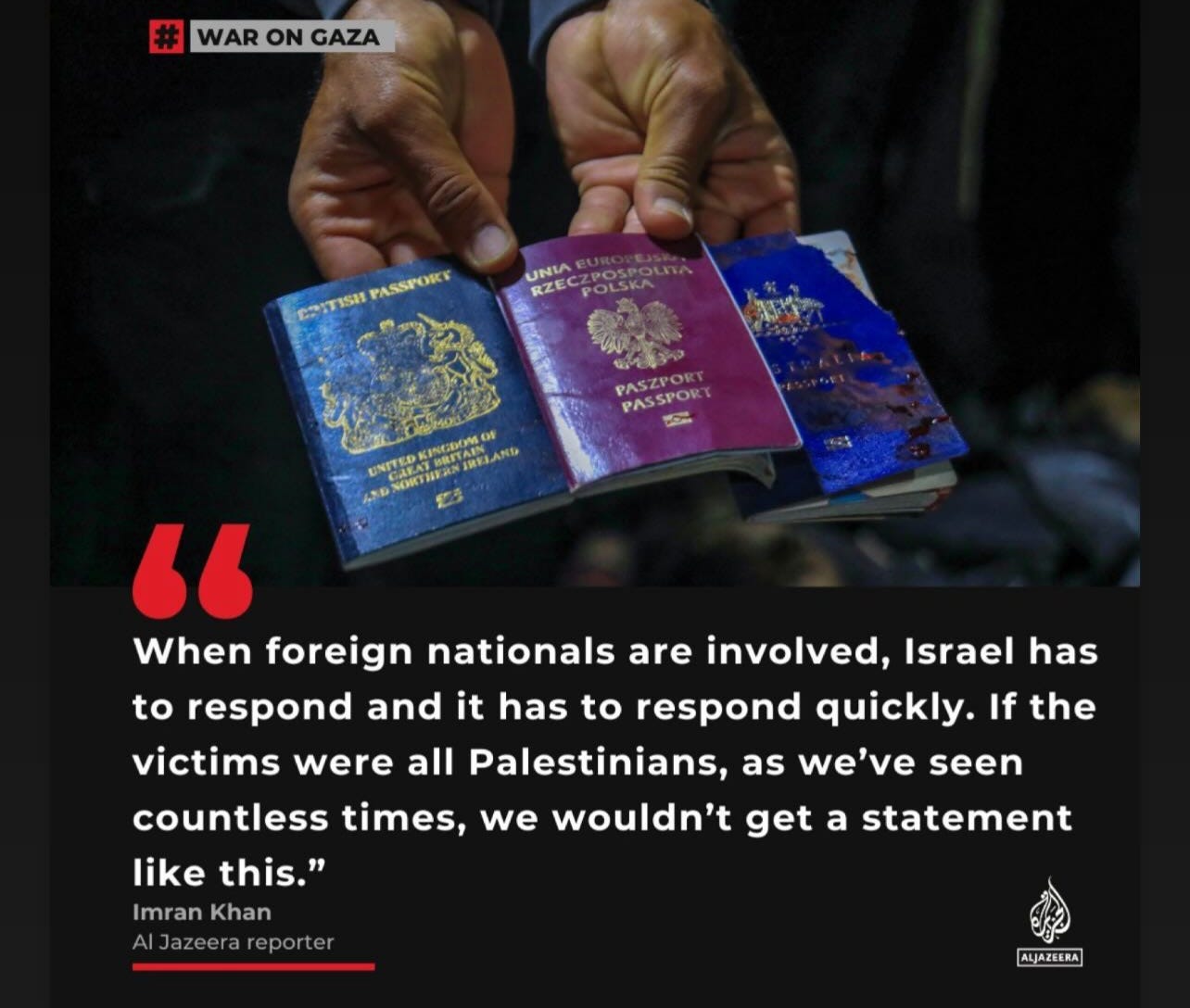When a life's value depends on its passport
What the killing of 7 aid workers in Gaza tells us about the importance of nationality in today's media coverage
After nearly two decades of covering events in the Middle East, it’s easy to get cynical about the phrase ‘turning point’. I remember the wisdom a veteran Arab journalist shared with me when I joined Al Jazeera English back in 2006: “If you want to be right about how things will unfold the Middle East, be pessimistic. You’ll feel cynical but, chances are, you’ll be proved right.”
I say this because the past few days have felt like a turning point in the Gaza war.
I was on air Monday night when news broke of the drone attack that killed several aid workers in Gaza. Even in the very first agency wires, the nationalities of the dead were mentioned: They were from the United Kingdom, Australia, Poland. One victim’s nationality was unknown at the time. One other was Palestinian. The first reports suggested only 5 had died, and there wasn’t much detail around the circumstances. A lot more has emerged since. Israel said it was a case of false identity and ‘grave mistakes’. The founder of World Food Kitchen, the NGO the aid workers were distributing food for, said Israel targeted his colleagues “systematically, car by car”.
But even in the first moments of the story breaking, the nationality of the victims was key. We’d later find out the total death toll was three Britons, one Australian, one Canadian-American, one Pole and one Palestinian.
Straight away it was obvious that because of nationality the world would pay attention to these deaths in a way it hadn’t to those of hundreds of other aid workers and tens of thousands of innocent civilians in Gaza. It is a distasteful truth that many journalists fight against every day, but it is a truth nonetheless.
My former colleague Imran Khan, who has spent decades covering this conflict on the ground, said this:
“When foreign nationals are involved, Israel has to respond and it has to respond quickly. If the victims were all Palestinians, as we’ve seen countless times, we wouldn’t get a statement like this.”
Imran is absolutely right. And he’s especially right to use the words “foreign nationals” in this case. Because it’s the victims’ nationality that is paramount in this story.
That all lives should be worth the same is an obvious statement to anyone with a moral compass. But they don’t, either politically or when it comes to media coverage. Though the two aspects are linked, let’s look at them individually.
Starting with politics, the indisputable point is that some countries have more power and influence than others. The UK is one of the 5 veto-wielding nations on the UN Security Council. The US, though not what it was, is still the world’s biggest superpower. And it’s certainly the only country that can bring any real pressure on Israel. Both nations have a duty to protect their citizens at home and abroad. So the killing of any of their citizens is a priority for them in the way that the deaths of ‘foreigners’ isn’t.
And then there’s the media angle. In many ways, the same logic applies to the media. Every broadcaster focuses on its nationals. If an Italian dies in tragic circumstances outside of Italy, their death will make headlines in Italy but not in the UK, unless it was a serious accident with a disproportionate number of victims. So, when a Briton or American die, their death will make the news on British and American networks. All news networks care about their domestic audiences first, as they should. That doesn’t mean they look away from tragedies far away, but their job is to cater to, and represent, their domestic audiences. There is nothing either surprising or wrong about this. It is human nature to empathise with those closest to us, whether it’s family, neighbours, or fellow citizens.
The problem arises with what we call ‘International News’.
If you’ve been reading this newsletter for a while, you’ll know that I don’t believe there’s any such thing as international news. To me, it’s English language news.
English is the global language. News organisations that print and broadcast in English automatically have a potential audience of 1.5 billion English speakers around the world. Many broadcasters and newspapers will have an ‘international’ channel or edition. But the mothership will always be the main domestic channel. That is usually both where the money comes from and where the core audience is. So what is seen as international news and/or Western news, are overwhelmingly American and British organisations, ultimately catering to their domestic audiences. I write about this in more depth here.
On a final point, yes, I know it’s complicated. Even as a Westerner of a non-anglophone/anglosaxon background, I’ve often felt the different weight given to different lives. Ethnicity and religion play a part in it, but nationality is key. If we’re going to properly talk about systemic inequalities, we need to look closely at the systems that bolster them, and I believe the way that the English language and global news intersect is definitely one of them.
But whatever the reason, let’s hope that we really are at a turning point in the war on Gaza.






Yes, pretty shocking but also totally predictable.
One thing which I noticed was that the 7 victims were initially reported as "Westerners" ... and it took a few hours before it was realised by the UK media that 3 of the victims were British. So in fact the UK media's initial strong sense of alarm was aroused by the thought of Western helpers having been killed, and therefore not specifically a "national-centric" thing as such.
I don't know if that makes it worse or better though! The brutal truth is that the Palestinians are captives in an Apartheid state, and that that IDF is profoundly incompetent, and that the State of Israel is run by incompetents who are also vicious. The IDF always goes in all guns blazing into civilian areas, and all the more so this time because of the scale of the obscenity perpetrated on 7 October (which could probably have been foreseen and certainly prevented with a less incompetent government). The IDF's utter recklessness and incompetence even led to the killing of 3 of its own hostages.
The thing about those Western aid workers, which perhaps puts a slightly different light on the story of "different ethnicities, different values for their lives", is that they were there in that terribly dangerous situation *voluntarily*. Everyone knows that none of them had to be there. Unlike the Palestinians.
Thank you Barbara for speaking with a balanced perspective showing humanity and decency on this touchy subject. As you say each life should have equal value irrespective of nationality or ethnicity.